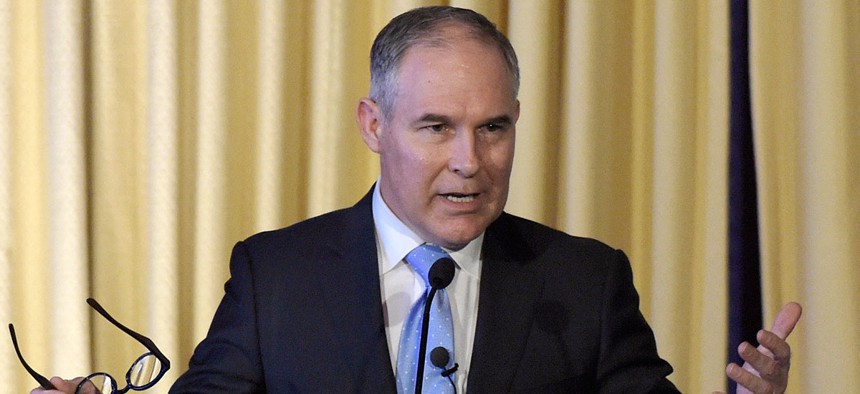
Susan Walsh/AP file photo
Analysis: Scott Pruitt’s Scandals Aren’t So Bad — By Russian Standards
The actions of Donald Trump's EPA chief that raise ethical questions would be seen as normal for officials in certain other countries with little rule of law.
Another day, another Scott Pruitt scandal.
The government’s internal watchdog ruled Monday that the luxury-loving Environmental Protection Agency administrator broke spending laws when splashing out $43,000 on an office phone booth. Tuesday, the Washington Post reports (paywall) he spent $10,200 of government money upgrading his car to a customized SUV, “because it was similar to ones in which some other Cabinet officials rode.”
Pruitt has become a household name thanks to the constant drip of headlines alleging lavish expenditures and abuses of power. Still, from some perspectives, he’s really just an everyday politician working hard at his job and making use of the privileges that come with it—as Donald Trump put it, he’s a “good man” doing a “terrific job.”
That is, if you go by the standards of Russia or Liberia—or even, in some ways, a democracy like India.
In countries with little rule of law, many of the scandals that beleaguer Pruitt would barely merit a tweet. “The whole idea that taxpayer money is there for [Trump officials] to squander so they can live high or escape debts—that’s just so characteristic of what we see in oligarchies and autocracies,” says Norman Ornstein, a senior fellow at the conservative American Enterprise Institute think tank.
Pruitt did nothing wrong—by Russian standards
A few weeks after starting his job in early 2017, Pruitt asked his security detail to turn on a siren just to whizz him to a meeting. After the agent in charge refused, he was moved to a different job, according to CBS News. One Republican senator reacted—to this and other missteps—by calling Pruitt “juvenile” and a “chucklehead.” In Russia, the siren request wouldn’t have even raised an eyebrow. Moscow drivers are so used to obscure politicians stopping traffic to zoom past them that the term migalki (“sirens”) has become a much-sighed buzzword in the Russian capital.
“From a Russian standpoint, [Pruitt] did nothing wrong. They use migalki every day—not when they are late, just every day to travel faster,” says Nikita Kulachenkov, an investigator at lead Russian opposition figure Alexey Navalny’s Anti-Corruption Foundation. He says there are even official lists of politicians allowed to skip traffic—though many officials who don’t make the list do so with impunity.
Regarding Pruitt’s lengthy list of activity, Kulachenkov had examples showing how each item would be just normal behavior for a Russian official:
- Spending $43,000 on a secure phone-booth in his office because he didn’t want to go down two floors to the EPA’s secure room.
- At the height of Russia’s recession in 2009, the Interior Ministry put out a $756,000 tender for furniture, including for a “gilded bed.”
- Sidelining or demoting (paywall) senior EPA officials who took him to task about lavish spending.
- In Russia, anyone predisposed to make a complaint like that would never make it to the senior level of a department, Kulachenkov says: “You would be fired many many years ago, when you start thinking of saying something like that.”
- Renting a room from a lobbyist whose company his department regulates—seemingly below market rate.
- Russian oligarchs are so intertwined with government that a deputy prime minister taking a vacation on a billionaire’s yachtis normal practice. The idea of renting a room being controversial would “make Russian government officials laugh,” Kulachenkov says.
- Spending $168,000 on charter, military, and first-class flights, despite EPA guidelines saying he should fly coach.
- Russian officials at Pruitt’s level are already allowed to fly business class and there are special lounges in Russian airports for officials.
- Circumventing the White House to give massive raises to two favored staffers.
- A salary bump to favorite staffers looks petty compared to Putin’s son-in-law swiftly making billions of dollars in the 18 months after marrying the president’s youngest daughter.
A lesson from Liberia on little luxuries
Pruitt’s spending choices and distaste for mixing with ordinary Americans in traffic or on planes is “something people in Liberia would take in their stride,” says Jonathan Gant of anti-corruption NGO Global Witness, an expert on the West African country. “You wouldn’t necessarily say it was wrong there; you would just sigh a big sigh.”
Gant distinguishes between the types of misbehavior Pruitt is accused of. One shows a petty disregard for government money and the people he is supposed to serve. The second is the notion that he used his office for personal gain by getting cheap rent from a lobbyist’s wife (Pruitt denies any impropriety).
The two types are interlinked, Gant says, using Liberia as an example: Disregard for the citizens you serve leads to the feeling that you’re working not for them, but your own personal interests Once that feeling is systemic, officials often see little problem in taking bribes to sell state contracts, as, for example, Global Witness reports Liberian officials may have done with Exxon.
There’s no evidence Pruitt has taken any kind of illicit payments for government work. But Gant points to the coincidence that he is rapidly undoing environmental regulations, while renting a cheap room from a woman married to a lobbyist whose industry is covered by EPA regulations. “If one no longer feels accountable for the money one is spending, or the way in which one treats people on the street, then who is it one is feeling accountable to?” Gant asks. “Is it nobody? Just your boss—the president? Or if you’re rolling back regulations for a specific sector of society is it only to them you feel accountable to?”
Ornstein adds that Pruitt spent tens of thousands of government dollars on a foreign trip to promote the US liquified natural gas (LNG) industry, despite the fact that selling LNG isn’t part of the EPA’s mission. His landlady’s lobbyist husband represented the only active LNG exporter in the US at the time, according to ABC News.
Appearances are everything: India’s example
Even if there’s no actual corruption, the perception that there could be is already deeply damaging. Any appearance of lax ethical standards sends a message to other officials and the public that government representatives can get away with dodgy-looking arrangements.
When trust between the public and government breaks down, it doesn’t look pretty, says Shruti Shah, vice president of the Coalition for Integrity (formerly Transparency USA). “Growing up in India, when I saw a pothole or something on the road I would never think, or my parents would never think, that we should approach a local council member to address the challenges…we didn’t think we could hold people accountable. We just accepted no services,” she says. “When I came to the US, this was the first time I understood what it meant to be a citizen, because I saw people writing letters to senators saying, ‘This isn’t fixed—I want this and that.'”
Once accountability is gone, systemic corruption branches out into education, employment, and most other facets of life. “It’s that sense of frustration and helplessness you have in India. You’re being declined opportunities because of corruption, you can’t hold people accountable, and feel you have no recourse,” she says. “I see similar frustrations here. I live in DC and we’ve had so many marches [about] this lack of ethics and integrity in our lives.”
Minor ethics violations can eventually become a system, says Ornstein: “A bit like when you look at synchronized swimmers, where you see their torsos above the water and it all seems relatively placid and hides what’s going on underneath. Petty corruption hides much more massive corruption—and invites much more massive corruption if it isn’t dealt with.”






